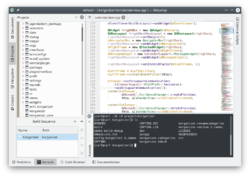KDevelop/pt: Difference between revisions
Appearance
Updating to match new version of source page |
Updating to match new version of source page |
||
| Line 10: | Line 10: | ||
KDevelop has experienced several rewrites. The first time was with version 3.x by Bernd Gehrmann in 2001<ref><!--(-->[https://marc.info/?l=kde-core-devel&m=98598814600661&w=2 A new IDE for a new millennium :-) by Bernd Gehrmann]</ref> and the second time was with version 4.x with a more object-oriented architecture in 2009<ref>[https://apaku.wordpress.com/2009/11/29/kdevelop4-moved/ KDevelop4 moved]</ref>. | KDevelop has experienced several rewrites. The first time was with version 3.x by Bernd Gehrmann in 2001<ref><!--(-->[https://marc.info/?l=kde-core-devel&m=98598814600661&w=2 A new IDE for a new millennium :-) by Bernd Gehrmann]</ref> and the second time was with version 4.x with a more object-oriented architecture in 2009<ref>[https://apaku.wordpress.com/2009/11/29/kdevelop4-moved/ KDevelop4 moved]</ref>. | ||
The development of KDevelop 5 started in August 2014 as a port of the KDevelop 4 codebase for | The development of KDevelop 5 started in August 2014 as a port of the KDevelop 4 codebase for Qt5 and KF5<ref>[https://www.kdevelop.org/frameworks/kdevelop-master-now-depends-kde-frameworks-5 KDevelop master now depends on KDE Frameworks 5!]</ref>. The custom C++ parser was abandoned in favor of clang, and the CMake interpreter was also replaced in favor of using the JSON metadata given by CMake. KDevelop 5 was released in August 2016<ref>[https://www.kdevelop.org/news/kdevelop-500-released KDevelop 5.0.0 release]</ref>. | ||
== Features<ref>[https://www.kdevelop.org/features KDevelop feature]</ref> == | == Features<ref>[https://www.kdevelop.org/features KDevelop feature]</ref> == | ||
| Line 28: | Line 28: | ||
* Integration support for multiple static analyzers: [http://clang.llvm.org/extra/clang-tidy/ Clang-tidy], [https://www.kdab.com/use-static-analysis-improve-performance/ Clazy] and the [http://cppcheck.sourceforge.net/ Cppcheck] | * Integration support for multiple static analyzers: [http://clang.llvm.org/extra/clang-tidy/ Clang-tidy], [https://www.kdab.com/use-static-analysis-improve-performance/ Clazy] and the [http://cppcheck.sourceforge.net/ Cppcheck] | ||
<span id="Tips"></span> | |||
== Dicas == | == Dicas == | ||
| Line 36: | Line 37: | ||
* [https://www.kdevelop.org/ KDevelop website] | * [https://www.kdevelop.org/ KDevelop website] | ||
* [https://en.wikipedia.org/wiki/KDevelop Wikipedia] | * [https://en.wikipedia.org/wiki/KDevelop Wikipedia] | ||
* [[Special:MyLanguage/KDevelop5/Manual|Manual sobre como começar no KDevelop 5]] | * [[Special:MyLanguage/KDevelop5/Manual|Manual sobre como começar no KDevelop 5]] | ||
Latest revision as of 05:24, 19 May 2024
 |
Um Ambiente Integrado de Desenvolvimento (IDE) para MS Windows, Mac OS X e Linux |
History (inspired by Wikipedia)
The KDevelop project started in 1998 at the University of Potsdam (Germany). The first released 0.1 was released the same year[1].
KDevelop has experienced several rewrites. The first time was with version 3.x by Bernd Gehrmann in 2001[2] and the second time was with version 4.x with a more object-oriented architecture in 2009[3].
The development of KDevelop 5 started in August 2014 as a port of the KDevelop 4 codebase for Qt5 and KF5[4]. The custom C++ parser was abandoned in favor of clang, and the CMake interpreter was also replaced in favor of using the JSON metadata given by CMake. KDevelop 5 was released in August 2016[5].
Features[6]
- Support C, C#, C++, CUDO, OpenCL, Qt QML, Javascript, Python and PHP
- Support multiple version control systems Git, Bazaar, Subversion, CVS, Mercurial (hg), Perforce
- Support multiple build system CMake, QMake, Makefile, Meson[7], ...
- Quick Code Navigation (Jump to declaration/definition)
- Code comprehension (Syntax highlighting, semantic code completion)
- Documentation integration
- Integration support for multiple static analyzers: Clang-tidy, Clazy and the Cppcheck
